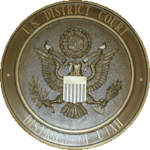|
Intellectual Reserve, Inc. v. Utah Lighthouse Ministry, Inc.
Intellectual Reserve, Inc. v. Utah Lighthouse Ministry, Inc., 75 F. Supp. 2d 1290 (D. Utah 1999), was a United States district court decision on the subject of deep linking and contributory infringement of copyright. BackgroundThe plaintiff, Intellectual Reserve, Inc., is a Salt Lake City, Utah-based corporation that owns the copyright and has the rights to other intellectual property assets used by The Church of Jesus Christ of Latter-day Saints. The defendants, Utah Lighthouse Ministries, Inc., operate a web site and publishes material critical of the Church.[1] The LDS Church had printed a work of text called the Church Handbook of Instructions: Book 1, Stake Presidencies and Bishoprics. This work had not been published, and had been prepared only for use within the church. The defendants had obtained a copy of the work and published parts of it on their website without reproducing the Intellectual Reserve, Inc. copyright notice. The copyrighted text had also been disseminated to other websites who had published the material, to which the defendants' website linked.[1] ArgumentsThe plaintiffs moved for a preliminary injunction and argued that:
The plaintiffs also argued that
Court findingThe court originally granted a preliminary injunction for the plaintiff and ordered the defendant to remove from the website the material that allegedly infringed plaintiff's copyright, and to refrain from reproducing or distributing verbatim in a tangible medium any material that allegedly infringed the copyright.[3] The court then issued a permanent injunction that "dissolved and vacated" the preliminary injunction, replacing it with an injunction based on a settlement between the parties.[2] In this injunction, the court forbade Utah Lighthouse Ministry from posting on the Internet, displaying, or reproducing the Church Handbook of Instructions. Lighthouse Ministry was further prohibited from posting on the Internet the URLs of any websites that hosted any materials from the Church Handbook of Instructions. ImpactPreliminary impactThe defendants did not raise the issue of the doctrine of fair use in their defense.[1] The case did not affect situations where the material being linked to is posted by the copyright holder or with the permission of the copyright holder.[4] This case did not raise the issue of transitivity, i.e. it is irrelevant whether the site that is being linked to contains any other questionable publications or links not related directly to the referenced material. If the transitivity was assured, virtually no single website would be eligible for linking, as the copyright infringement can occur in user comments or user links. The preliminary finding was, as long as a link leads to a material legally published, the link should be considered valid. Permanent impactThe permanent injunction "dissolved and vacated" the preliminary injunction's and temporary restraining order's legal effects on the defendants.[2] However, the court's order remains valid case law, and it has been cited by a few other courts.[note 1] See alsoNotes
References
External links
|
||||||||||||||||||
